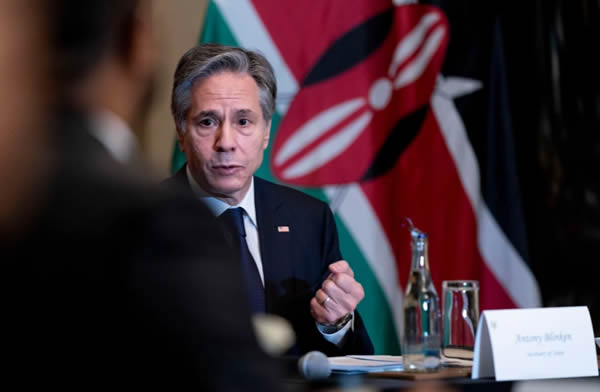
U.S. Secretary of State Antony Blinken travels to East Asia and Africa next week seeking to counter the influence of Russia and China in a fight for global influence.
Blinken begins his travels Tuesday on a tour that will take him to Cambodia, the Philippines, South Africa, the Democratic Republic of the Congo and Rwanda.
During his first stop in Cambodia, he will attend a Southeast Asian regional security forum where both the Russian and Chinese foreign ministers are expected to be in attendance.
When asked if Blinken would hold direct meetings with either Russian Foreign Minister Sergey Lavrov or Chinese Foreign Minister Wang Yi, Assistant Secretary of State for East Asia and Pacific Affairs Daniel Kritenbrink said there were no plans for formal meetings at this time.
During a briefing with reporters about Blinken’s trip, Kritenbrink did not rule out the possibility of an informal conversation between Blinken and Wang on the sidelines of the Association of Southeast Asian Nations Regional Forum in Cambodia.
Blinken spoke to Lavrov on Friday in the first conversation between the high-level officials since Russia’s invasion of Ukraine in late February. Blinken pressed Lavrov to accept a U.S. proposal to secure the release of two Americans detained in Russia —professional basketball star Brittney Griner and former U.S. Marine Paul Whelan.
The State Department said in a statement Friday that Blinken will address the COVID-19 pandemic, climate change, Myanmar and the war in Ukraine during the ASEAN ministers meeting.
Kritenbrink said Blinken would urge Asian nations to increase pressure on Myanmar after its government executed four activists this week.
“This is just the latest example of the regime’s brutality,” he said.
While in the Philippines, the secretary’s next stop, Kritenbrink said Blinken would reaffirm the U.S. commitment to the two countries’ mutual defense treaty, which he called “ironclad.”
Blinken then travels to Africa, part of an increased U.S. diplomatic effort in the region that follows Russia’s outreach to the continent.
USAID chief Samantha Power recently visited Kenya and Somalia, and U.S. Ambassador to the United Nations Linda Thomas-Greenfield is planning to travel next month to Ghana and Uganda.
The visit by Blinken is part of the U.S. view that “African countries are geostrategic players and critical partners on the most pressing issues of our day,” according to a State Department release.
Each of the African countries Blinken is visiting — South Africa, the Democratic Republic of the Congo and Rwanda — is a “significant player on the continent and on the globe,” according to Assistant Secretary of State for African Affairs Molly Phee.
She told reporters Friday the secretary will deliver a speech on U.S. strategy toward sub-Saharan Africa while in South Africa.
Russia’s war in Ukraine is expected to be a major focus during Blinken’s stops in Africa.
Russia’s Lavrov this week wrapped up a tour of four African nations to strengthen ties with the continent and seek support against Western pressure over Moscow’s invasion of Ukraine.
Most African nations have remained neutral on the Ukraine war, despite pressure from Washington to condemn Russia’s invasion.
During his visit to the continent, Lavrov praised African nations for their independence.
Climate change will be another important topic during Blinken’s tour of Africa, according to Phee, who said the secretary would press Congo on its plan to reopen its rain forest to commercial logging.
While in Rwanda, Blinken will raise the “wrongful detention” of U.S. permanent resident Paul Rusesabagina, according to the State Department. Rusesabagina’s actions saved hundreds of lives during the 1994 genocide and inspired the movie Hotel Rwanda.
“We’ve been very clear with the government of Rwanda about our concerns about his case, his trial and his conviction, particularly the lack of fair trial guarantees in his case,” Phee said.
She said Blinken would also work to ease tensions between Congo and Rwanda. Congo has accused its neighbor of backing M23 rebels, a charge Kigali denies.
Some information in this report came from The Associated Press, Reuters, and Agence France-Presse.























